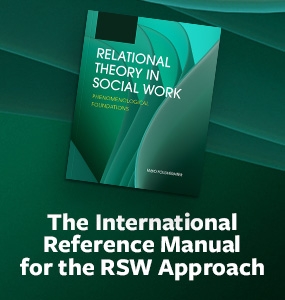Editorial
Fabio Folgheraiter
Università Cattolica del Sacro Cuore, Milan, Italy
We are grateful to present this issue of the Relational Social Work Journal. As usual, this issue presents both empirical research articles and articles that reflect on interventions/projects from a social work perspective.
It is the editor’s intention that the Journal provides a reflection on social work with a focus on relationships and how they influence or contribute to the definition of social work interventions, the organisation of services and the definition of policies.
We believe that the importance of relationships in social work is an acquired and undoubted awareness, but understanding how they can guide the approach to social work is neither simple nor obvious. For this reason we believe it is important to continue to reflect and explore this issue. Thanks to the contribution of the authors with each issue of the Journal we can continue this process of knowledge and learning.
The first article by Knevel and colleagues from Netherlands presents data from two projects with adults with intellectual disabilities, social workers and educators who participated together in workshops and focus group meetings. Thanks to these meetings, the ecological model proposed by Simplican et al. (2015) was evaluated for its practical value for social work. After this work, the researchers propose some suggestions that make the ecological model more dynamic. These findings make it possible to improve the ecological model and make it more responsive to changing and complex practices.
In their article Martin and Pesenti (Italy) introduce us in the topic of the organizational effectiveness (OE) within nonprofit organizations. Drawing on evidence from a dialogic-participatory action research conducted within an Italian regional food bank, the article proposes a relational analysis of OE. The study pursued aimed to facilitate the collective construction of knowledge, and it sought to empower participants by providing them with opportunities for active engagement in effecting changes and improvements through participatory reflection, thus devising actionable strategies to enhance organizational effectiveness.
This is followed by an article from Finland by Tarkiainen and Heino. The two authors present findings from a qualitative study in which 17 Finnish social workers participated in two group interviews with the aim of discussing social work-relevant popular culture representations and the usefulness of popular culture for social work practice. The thematic content analysis allowed to identify two main benefits of popular culture in social work. First, social work-relevant popular culture representations were described as useful for practitioners’ self-reflection, as they can be used to assess different actor positions and reflect practitioners’ own emotions, different interpretations, assumptions, epistemological positions and actions. Secondly, popular culture materials can be useful in informing relational social work practice by building trust between social workers and clients.
Zenarolla (Italy) reflects in her article on the opportunities offered by digitalisation to rethink and innovate the role of the social service and the function of the social worker. Based on the results of a qualitative research carried out by interviewing social service managers on the changes that digitalisation has brought to their service through the COVID-19 pandemic, the paper focuses on the changes that have occurred in the relationship between social workers and ICTs. The study confirms that ICTs can trigger organisational learning processes that can change the way practitioners work and the way services are organised. The findings also provide interesting insights into how to capitalise on the positive aspects of digitalisation imposed by COVID-19 and how to rethink the training of social workers in order to develop and enhance their digital skills.
Finally, we can read a reflection on the practice of Individual Placement and Support (IPS), a model to support the placement of people with mental disorders in the workplace. The article describes the phases through which the IPS method is implemented. Furthermore, the authors propose a reflection on the experience of implementing this model thanks to an agreement signed between the Mental Health Centre and the non-profit organisation «LaboratorioAperto» since 2013. The strengths and critical elements are identified and addressed, and the most effective standardised assessment tools are presented.
We would like to thank once again the authors whose contributions enable us to continue studying social work.
Milan, April 2024




